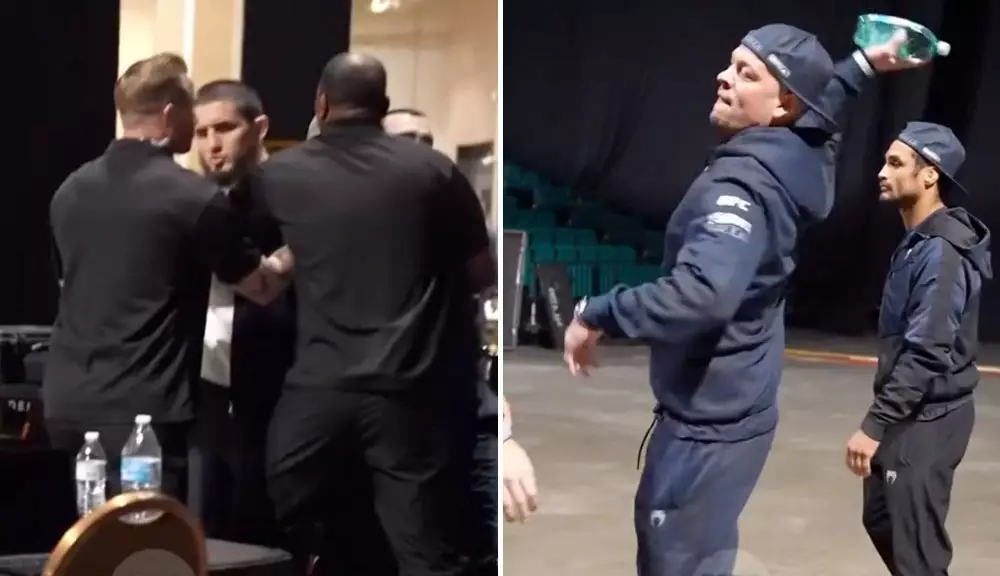The world of mixed martial arts is often characterized by its fierce rivalries and dramatic confrontations, both inside and outside the octagon. One such incident has surfaced involving UFC lightweight champion Islam Makhachev and veteran fighter Nate Diaz. The altercation, which took place at the MGM Grand Garden Arena in Las Vegas, raised eyebrows and left fans questioning the motivations behind elite fighters’ actions. Makhachev attributed the chaotic moment to an inexplicable response from Diaz and defended himself by clarifying that he did not incite the conflict. This article delves into the details of the incident, analyzes potential underlying tensions between the fighters, and highlights the implications for the fighters’ careers moving forward.
Makhachev and Diaz found themselves under the same roof during two prominent UFC events: Makhachev was present for the UFC 311 press conference, while Diaz attended to support Kron Gracie during UFC 310’s ceremonial weigh-ins. What seemed to be a routine gathering quickly escalated into chaos when Diaz seemingly unleashed his frustration, hurling expletives and even a bottle in Makhachev’s direction. Witnessing a close friend involved in such disputes, Makhachev’s teammate Magomed Zaynukov felt compelled to reciprocate, throwing an object back towards Diaz. As with many tense situations, security personnel were quick to intervene, attempting to defuse the confrontation.
Considering the background leading up to this moment, it’s essential to assess what might have triggered such drastic behavior from Diaz. Makhachev stated that he was left perplexed by Diaz’s actions, underpinning a gap in their previous interactions where mutual respect was exhibited. He recounted a more amicable encounter with Diaz months earlier at a hotel, shedding light on the bewildering intensity that seemed to arise out of nowhere.
In the realm of professional sports, media presence often magnifies the emotions surrounding athletes, transforming a private matter into a public spectacle. Makhachev insinuated that Nate Diaz’s actions were heavily influenced by the presence of cameras. The notion that athletes might behave dramatically when they feel the spotlight is on them does not seem far-fetched. As Makhachev expressed, his previous interaction with Diaz was notably respectful, leading him to wonder why the latter’s demeanor had altered so drastically when the media spotlight brightened.
Fighters, especially popular ones like Diaz, often recognize the entertainment aspect of the sport, where inflammatory behavior can generate headlines and enhance their marketability. Thus, from a psychological perspective, Diaz’s hostile reaction could stem from a desire to reclaim narrative control and create buzz in the lead-up to forthcoming fights.
Despite the flashpoint in their dynamic, Makhachev emphasized his belief in resolving any issues privately rather than contributing to escalating drama. Clearly, the incident has left him frustrated, as he conveyed through his dialogue with UFC CEO Dana White. “I’m not starting this,” he asserted, indicating a deeper desire for peace over provocation. Makhachev’s commitment to maintaining his team’s solidarity during the uproar illustrates the loyalty and responsibility he feels toward those surrounding him.
The implications of this altercation stretch beyond just personal animosity; they pose questions about sportsmanship and professionalism in combat sports. Makhachev expressed a willingness to confront conflict directly, a commendable trait that may resonate with fans and fellow fighters alike who value humility and accountability. However, in contrast, Diaz’s unpredictable behavior introduces uncertainty, which can be both entertaining and chaotic.
As Makhachev prepares to face Arman Tsarukyan in an upcoming title bout at UFC 311, this altercation may linger, affecting not only his focus but also the public perception of both fighters. With their match likely to be viewed through the lens of this recent conflict, added pressure is inevitable. It’s realistic to argue that the pre-fight narrative surrounding such incidents can significantly impact an athlete’s performance and mentality.
The volatile encounter between Islam Makhachev and Nate Diaz serves as a captivating study of human behavior within the high-stakes world of mixed martial arts. While the event itself may have been fueled by immediate emotion, the aftermath raises critical questions about respect, rivalry, and the complex relationship between athletes and their public personas. As Makhachev gears up for his title defense, the dynamics surrounding this incident will likely influence the unfolding storylines in the months ahead.

